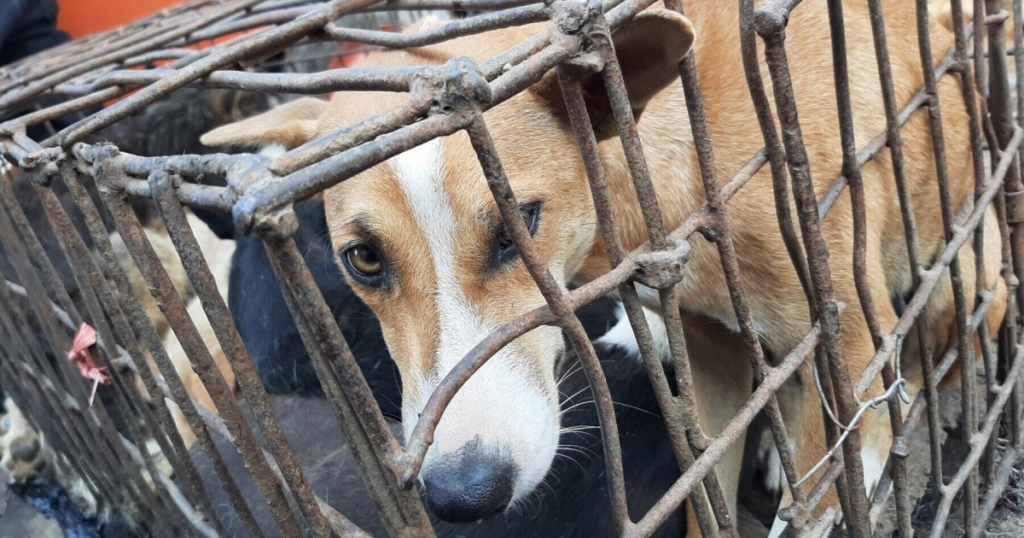Take Action: End cruel fur farming worldwide.
Sign the petition to end the cruel dog meat trade.
Take Action: End cruel fur farming worldwide.
Every year, millions of dogs and cats are captured and transported across Indonesia for the brutal dog and cat meat trade. Many are stolen family pets or strays snatched from city streets and rural areas. These animals are crammed into cages or sacks so tightly they can’t move, often with their mouths bound shut, barely able to breathe. Enduring excruciatingly long journeys on bikes or overcrowded trucks, they are taken to markets, slaughterhouses, and restaurants. Some die from suffocation, dehydration, or heatstroke before reaching their destination. For those who survive, their fate is even more horrific forced to witness others being killed before their own agonizing death. The terror and suffering they endure is unimaginable.
Donate now to help stop this cruel trade and protect all animals.
HSI is a founding member of the Dog Meat Free Indonesia (DMFI) coalition, working alongside international and national organizations to end the dog and cat meat trade in Indonesia. The coalition works to expose the cruelty, raise awareness and push for legal reforms to stop the trade, protect animal welfare and prevent associated public health risks such as the spread of rabies.
DMFI investigations have exposed the severe animal cruelty and the significant threat to human health. The dog meat trade involves the mass movement of dogs of unknown disease status between provinces and islands. The World Health Organization (WHO) has highlighted this trade as a major contributor to the spread of rabies in Indonesia. By moving rabies-positive dogs into densely populated areas, such as Jakarta, which has worked hard to achieve a rabies-free status, the trade undermines rabies control efforts across the country.
Unsanitary conditions at slaughterhouses and markets add another layer of concern. Traders, slaughterers, vendors and consumers are exposed to rabies and other zoonotic diseases. Evidence shows that rabies-positive dogs are being sold and slaughtered for consumption, particularly in North Sulawesi’s infamous traditional markets, where dogs and cats are sold alongside other animals such as chickens and wildlife.
In addition, when vaccinated dogs are taken from their communities for the dog meat trade, this reduces the overall number of immune dogs, lowering the population’s herd immunity. As a result, rabies can spread more easily among the remaining unvaccinated or partially vaccinated dogs in the community.
While only an estimated 4.5% of Indonesia’s population consumes dog meat, the trade puts the entire country at risk.
The vast majority of Indonesians (around 95%) do not eat dog meat. It is most consumed in certain areas, such as Manado and Medan, where it is considered a traditional food, particularly among Batak and Christian populations. Consumption often peaks during festive occasions like Christmas, Thanksgiving, weddings and baptisms.
Dog meat is also eaten in the mistaken belief that it offers health benefits, such as curing asthma or dengue fever, boosting the immune system, or improving male stamina. Contrary to popular belief, dog meat is not consumed because it is a cheap protein source—it is priced similarly to other meats. Cat meat is far less common, with around 1% of Indonesians consuming it. However, thousands of cats are traded every year, especially in North Sulawesi markets.
Countries and regions across Asia—such as the Philippines, Taiwan, Singapore, Hong Kong, Thailand and Malaysia—have banned the dog and cat meat trade due to the cruelty and health risks involved. In Indonesia, opposition to the trade is growing, especially among younger generations, thanks to rising pet ownership and increasing concern for animal welfare.
Although Indonesia lacks explicit regulations banning the dog and cat meat trade, several existing laws could be enforced to curtail it. These laws cover consumer safety, public violence, livestock transportation, animal abuse, theft and quarantine. Strict enforcement of these regulations could dramatically reduce or even eliminate the dog and cat meat trade in Indonesia.
Through the Dog Meat Free Indonesia coalition, our campaigns have already achieved 50+ bans in cities, regencies and provinces across Indonesia and we are campaigning for an outright ban on the dog and cat meat trade. Add your voice by taking action now.
The Dog Meat Free Indonesia coalition believes that strong actions must be extended to the whole of Indonesia in order to shut down the brutally cruel, unsanitary and unsafe dog meat trade. Speak out and donate now to help dogs and other animals in need.
Share This:
© 2025 Humane World for Animals is registered as a 501(c)(3) nonprofit organization. Contributions to the Humane World for Animals are tax-deductible to the extent permitted by law. The Humane World for Animals tax identification number is 53-0225390.

